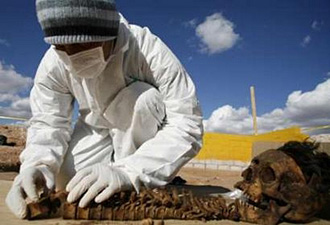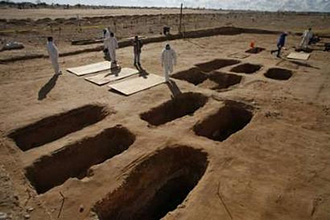 |
 |
 |
 News Around the Republic of Mexico | December 2007 News Around the Republic of Mexico | December 2007  
Ciudad Juarez Digs Up Unknown Bodies
 Ignacio Alvarado - Reuters Ignacio Alvarado - Reuters
go to original


| | A forensic worker places bones from a skeleton after being exhumed from a mass grave at a cemetery on the outskirts of the border city of Ciudad Juarez, December 12, 2007. (Reuters/Tomas Bravo) | 
| | Forensic workers work at a mass grave at a cemetery on the outskirts of the border city of Ciudad Juarez, December 12, 2007. (Reuters/Tomas Bravo) |
Ciudad Juarez, Mexico - One night in May 1994, former U.S. naval officer Saul Sanchez and his wife Abigail were getting ready for the theater in this northern Mexican city when armed men banged on their door and dragged them away. They were never seen again.

Relatives think they were murdered and that their bodies lie with thousands of unidentified corpses in municipal common graves in Ciudad Juarez, infamous for police negligence and a crumbling justice system.

Grieving families may finally get closure after anger over the mass graves prompted the Chihuahua state attorney general's office to start exhuming some 1,200 unidentified bodies buried between 1991 and 2005.

Sixteen have been dug up since work started this month and forensics experts hope to exhume 14 more by the end of the year.

"We, like so many others, have wanted to know for so long what happened to Saul and Abigail," said family friend Jaime Hervella, who is part of a movement to force the authorities to open up the plots in a sandy pit in the San Rafael municipal graveyard.

"It has been so terribly hard not knowing all these years," she said of the retired Mexican-American and his wife, who had lived in Ciudad Juarez for several years.

Many cities have communal graves as the authorities deal with unidentified bodies, often of homeless people or crime victims.

But the large number of unknown dead in Ciudad Juarez, across the Rio Grande from El Paso, Texas, reflects a failure to properly investigate rampant crime, which includes a wave of murders of women.

Rights groups frequently accuse police in Ciudad Juarez of negligence or links to criminal gangs.

Some 400 women and girls have been murdered in the city since 1993, many on their way to or from work at assembly-for-export factories. Despite international pressure to solve the murders, including support from writers, singers and Amnesty International, most cases remain mysteries.

DRUG VIOLENCE

The city also suffers from the drug-related killings that blight much of Mexico's north, where cartels fight over smuggling routes. Local media say Sanchez's disappearance may be linked to his involvement in the illegal drug trade.

Relatives hope DNA tests on exhumed corpses may now provide clues to some of the murders.

"We're very hopeful of identifying some of the missing in the grave," said Marilu Garcia, who heads a group of mothers of disappeared Ciudad Juarez women. "As soon as any female remains are identified we'll push to speak to the state attorney general."

As the bodies are exhumed, white-suited forensics workers extract the skeletons and DNA tests are run in a lab.

"The idea is to create an identification database on the grave site that can serve as a model for other Mexican cities with a similar situation to Ciudad Juarez" said Mario Ruiz, a spokesman for the state attorney general's office.

State officials declined to comment on why they allowed so many unlabeled bodies to build up in the San Rafael graveyard or why they resisted opening it up until now.

Some civic leaders accuse police of complicity in many of the murders and of helping to cover up killings. Others are skeptical the identification process will be transparent.

"Don't tell me an official wouldn't take a $100 bribe not to identify a victim. There's a lot of pressure to keep quiet about some of the killings," said Hervella.

(Writing by Robin Emmott; Editing by John O'Callaghan) | 
 | |
 |



